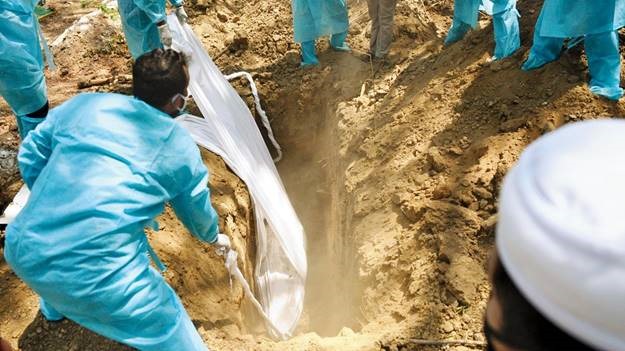The BMC has barred the Parsi practice of letting the bodies of community members dying of Coronavirus decay naturally saying traces of the virus could spread through pallbearers
Most Parsis are opposed to the burial or cremation of the bodies of community members dying of COVID
The Centre’s stand in the Supreme Court that it won’t change the funeral SOPs for Parsis dying of COVID has upset the community. The Surat Parsi Panchayat had moved a PIL in the apex court seeking permission to follow their traditional funeral rites of letting corpses decay naturally. Earlier, the Gujarat High Court had observed that COVID guidelines are in ‘larger public interest’ and do not violate any fundamental rights. Parsis are opposed to the burial or cremation of bodies.
Echoing the community’s sentiments, Noshir Dadrawala, one of the trustees of the Bombay Parsi Punchayet (BPP) said, “They [relatives] would much prefer to dispose the dead at wherever the towers of silence are, in Mumbai or Surat. They would like to see their loved ones go the way their ancestors departed. This is more of a community sentiment, irrespective of someone being orthodox or reformist.”
Religion aside, Dadrawala said, a majority of Zoroastrians have never been exposed to burials or cremations. He said, “In western India, including Mumbai and Pune, where the largest concentration of Parsis is, it is new for them. And they also feel that if other minorities have been allowed burial rights, then why not us? Sky burial is one possibility. Covid protocols like ensuring PPE kits for pallbearers, confining it to the dakhma [tower of silence], putting them under solar concentrators to eliminate bacteria, virus. We are willing to follow the scientific protocols.”
Currently, the BMC has prohibited the Parsis from performing their traditional funeral rites on the grounds that traces of the virus could spread through pallbearers.
“A lot of them are still very traditional and even the reformists were appalled as they did not know if they received their departed relatives’ ashes during peak COVID last year. Imagine not being able to give even a dignified farewell to your loved ones. The way the bodies were disposed and handled, relatives were distraught. If it would have been done at Doongerwadi, there would have been solace more for the living than the dead,” said Dadrawala.
Vistaspar Mehta, the manager at Doongerwadi and a voluntary pallbearer, said the number of COVID-related victims’ bodies has reduced by 15 per cent at the city’s Tower of Silence because of protocols to cremate or bury them. “There was a scare initially and everyone, including the authorities, did not know anything when COVID broke out. We did not know how it would spread. We took precautions like ensuring masks, PPE kits, face shields, gloves, sanitisation and social distancing. We have gone through plagues as well, so we can manage this too. We are on for it, provided the BMC allows. The Health Ministry also knows, what it is doing. But we can prove that our rituals will not spread infections. The government thinks it can be a health hazard if we follow our rituals,” he said.
Parsi priest, experts differ
“We have to follow the government rules for disposal of bodies owing to COVID and every religion is following it. These protocols are new for everyone so where is the question of not following it. However orthodox you may be, you cannot dictate the government. I don’t think it is about rituals, rather a prevailing pandemic. I am following what the government is stating since 2019 for COVID-19 victims and also doing prayers for those who come for cremation, but keeping in mind the rules. I don’t do it openly, I do the prayers inside the ambulance with the body kept inside and the parties are absolutely okay with this,” said reformist priest (dastur) Framroze Mirza.
Mirza believes that whatever the government is doing is to protect those who are alive and do not fall prey to this pandemic. He said even at the Worli prayer hall for Parsis where he conducts cremation prayers, the bodies come wrapped well and all rules are followed.
Parsi culture expert Farrokkh Jijina also believes that culture cannot be preserved at the cost of the larger good and one has to move with time. He said if the Health Ministry feels this is an incorrect way of disposal and could cause contamination to the pallbearers, then the alternative must be followed. “Culture is as important as the laws of the land. Religion is not more important than the larger good to people. Also, Dokhmenashini was an excellent system until a few years ago when there were vultures in Mumbai.”
The government’s SOPs for disposal of COVID victims’ bodies are based on the recommendation of WHO (World Health Organisation).

